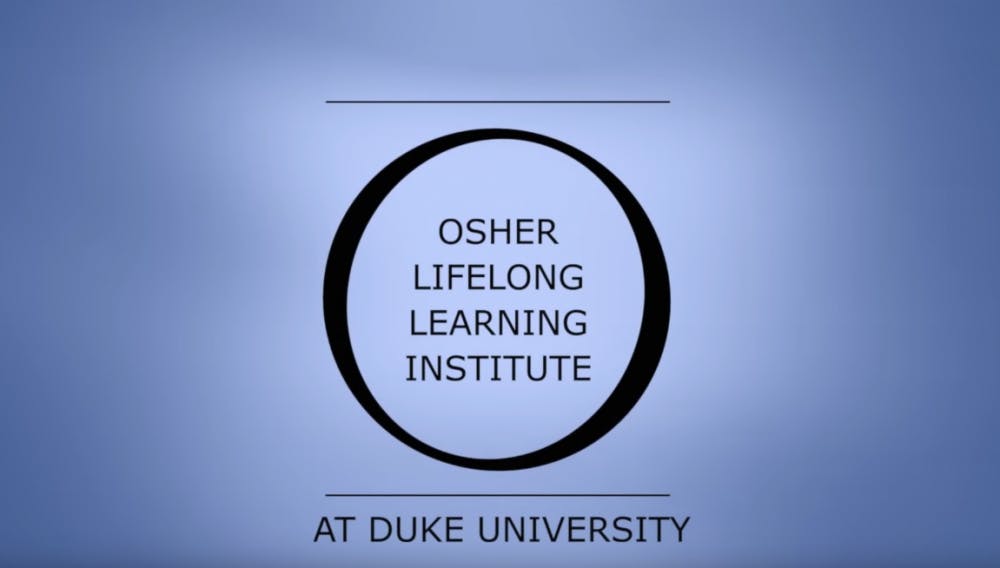As undergraduates began classes last week, a slightly older demographic at the University's Osher Lifelong Learning Institute also began their studies.
OLLI at Duke, previously known as the Duke Institute for Learning in Retirement, was founded in 1977 as a joint venture between Duke Continuing Education and the Center for the Study of Aging and Human Development. The curriculum committee offers a wide array of non-graded and non-exam courses in subjects such as history, religion, philosophy, natural sciences, performing arts, art, architecture and finance. Courses are offered in the Fall, Winter and Spring terms with fresh offerings each semester according to members' requests.
Ginger Wilson, head of the history and current affairs section of the curriculum committee at OLLI, said that OLLI benefits both participants and instructors—in particular, the elderly population.
“OLLI participants and instructors are lifelong learners, and OLLI courses enrich their lives," Wilson said. "OLLI courses introduce them to new ideas and new material. OLLI helps older citizens stay young and maintain old interests and gain some new ones."
During the Winter semester, OLLI will offer 154 courses—such as “Building Duke Chapel," “Alfred Hitchcock: A Career," “Introduction to 3D Printing,” “Creative Travel Journals” and “Becoming Wise: Delving Into the Mystery and Art of Living.”
According to its website, OLLI caters to a diverse community including "high school drop-outs and college presidents, native North Carolinians and newcomers, professionals and homemakers.”
Most OLLI members are retired and typically range in age from 50 to 90 years old. Garry Crites, director of OLLI, said he believes that OLLI is especially useful as a platform to cope with aging and retirement.
“The quality of life for someone in retirement age is enhanced greatly by continuing to use your mind and continuing to take classes," he said. "It really helps with depression and mental clarity and in some cases, the length of life increases."
Crites said that OLLI’s history courses are among the program's most popular offerings. Although new courses are offered every term, popular history courses on topics such as the Ottoman Empire, Franklin Roosevelt, Winston Churchill, late 19th century Europe, Russia, Japan and military history are often repeated. He added that OLLI’s biggest class, however, is “Symposia at The Forest at Duke: A (Mostly) Scientific Invited Speakers Program,” which features Duke faculty and has about 150 class members.
There are no educational requirements for courses, he said, but OLLI members are highly educated and 61 percent of OLLI members have at least a master’s degree.
“Our most popular classes are academic classes that are taught on the undergrad or grad level," Crites said. "A lot of members were once on the top of their fields, be it in business, politics or medicine, but now have the freedom to explore other areas."
The program does not restrict its offerings to the age bracket of 50 or older and sometimes has members who are in their 20s, Crites added. He said he believes this diverse mix of ages allows for healthy intergenerational interactions.
OLLI is also starting to reach out more to local high schools to include a greater participation from a variety of age groups.
“We are doing more and more intergenerational work," Crites said. "There are collaborations between OLLI and local high schools to study topics such as ethics. I think both groups benefit from the other.”
Crites explained that OLLI has collaborated with Duke undergraduates for years but only recently started working with high school students this Winter semester, which began Jan. 7 and will end on March 27.
This coming year, Wilson and her husband are teaching “A Time To Remember: The Post-World War II years 1945-1963 in the United States” this Winter term and will lead a course on Britain during the 1870-1920 period in the Spring term. Crites—who has a Ph.D. in the history of Christianity and usually teaches religion courses—will be teaching a course on Celtic culture this winter term.
Looking back, Crites noted that he thoroughly enjoys working with OLLI and has benefitted from educating the elderly in new ways.
“All of my life before OLLI, my exposure to people in aging had been mainly confined to clinics and hospitals," Crites said. "Through OLLI, I have discovered a very vibrant and intelligent community.”
Get The Chronicle straight to your inbox
Signup for our weekly newsletter. Cancel at any time.

